Database Management System- Advantages and Disadvantages of DBMS
Database Management System-DBMS
A DBMS is a software system that enables the creation, organization, and management of databases. It provides a systematic way to store, retrieve, and manage data.

The concept of DBMS emerged in the 1960s with the advent of computers. Early systems like IBM’s IMS were hierarchical, and in the 1970s, the relational model proposed by E.F. Codd revolutionized data management, leading to the development of modern DBMS like Oracle, MySQL, and Microsoft SQL Server.
Read How DBMS is different RDBMS
Why is DBMS important?
In today’s data-driven world, DBMSs are crucial for managing vast amounts of data efficiently and securely, supporting everything from banking systems to social media platforms.
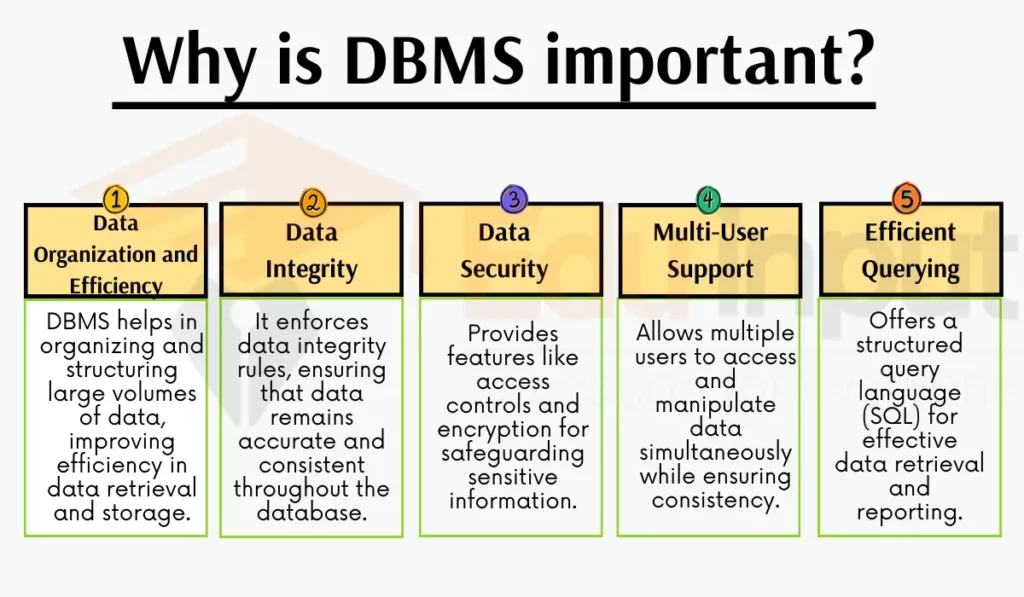
Database management systems are designed to provide reliable storage and retrieval of data. A database management system may be used to manage any type of data including text, numbers, images, video, audio, etc.
Types of Database Management Systems
Here are the main types of Database Management Systems:
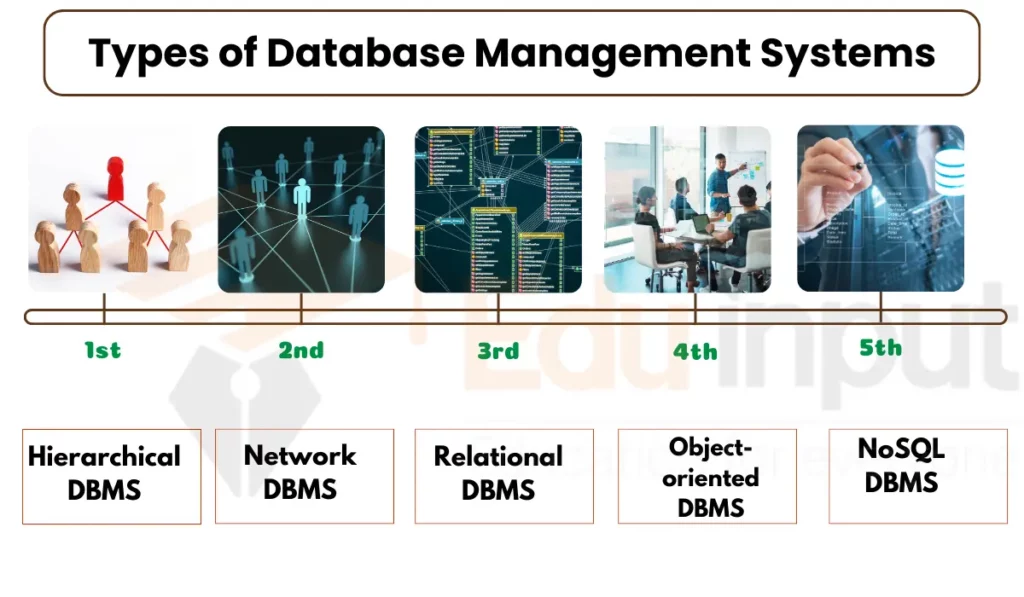
- Hierarchical DBMS: This model, reminiscent of a family tree, organizes data in a top-down or bottom-up format. Each record has a single parent but can have multiple children, making it efficient for certain types of data retrieval but less so for complex transactions.
- Network DBMS: Enhancing the hierarchical model, the network DBMS allows each record to have multiple parent and child records, forming a lattice structure. This model is more flexible than the hierarchical one but can be complex to design and manage.
- Relational DBMS (RDBMS): The most widely used type, RDBMS, stores data in tables (relations) that can be linked by common fields. The relational model’s simplicity, power, and flexibility have made it the standard for database systems. SQL is the primary language used for RDBMS.
- Object-oriented DBMS: This type integrates object-oriented programming principles, storing data in objects. This model is ideal for applications that require a tight integration with object-oriented languages like Java, C++, or Python.
- NoSQL DBMS: Designed to handle large volumes of distributed data, NoSQL databases are ideal for big data and real-time web applications. They are known for their ability to handle a variety of data models, including document, graph, key-value, and columnar formats.
Components of DBMS
Here are the main component of Database Management Systems:
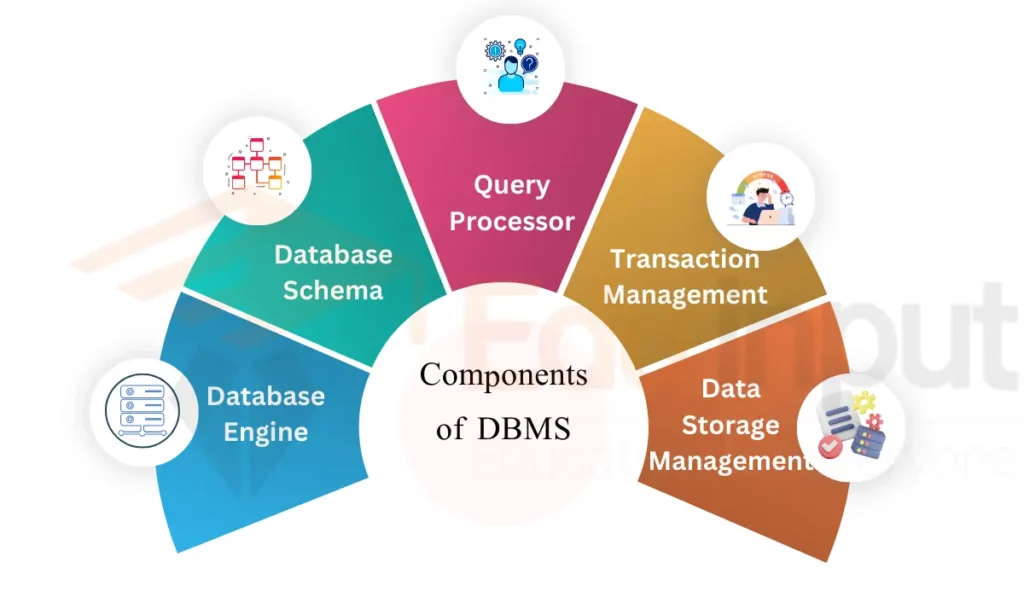
- Database Engine: This is the heart of the DBMS, responsible for storing, retrieving, and updating data in the database. It ensures that the data is consistently maintained and reliably stored.
- Database Schema: It is like a blueprint of the database, defining its logical structure. A schema specifies tables, fields, relationships, indexes, and constraints. It ensures that data is organized in a way that supports efficient data retrieval and manipulation.
- Query Processor: This component interprets and executes the database queries written in SQL or other query languages. It optimizes queries for efficient data retrieval, ensuring quick response times.
- Transaction Management: This ensures that all database transactions are processed reliably and adhere to ACID properties. It maintains the integrity and consistency of the data even in cases of system failures or concurrent access.
- Data Storage Management: This component is responsible for how data is physically stored, retrieved, and updated on storage media. It deals with data compression, fragmentation, and indexing, which are crucial for optimizing storage space and improving query response times.
Database Models
- Flat Model: This is the simplest form of database model where data is stored in a single table, much like a spreadsheet. It’s straightforward but limited in terms of data relationships and data integrity.
- Hierarchical Model: In this model, data is organized into a tree-like structure with a single root and several levels of hierarchy. It’s efficient for certain types of queries but can become complex and inflexible, especially when dealing with many-to-many relationships.
- Network Model: This model allows more complex relationships than the hierarchical model, with records that can have multiple parents and children. It’s more flexible but can be complex to design and navigate.
- Relational Model: The most popular and widely used model, it organizes data into tables (or relations) of rows and columns. The relational model is highly flexible and supports a wide range of data types and operations, making it suitable for most business applications.
- Object-Oriented Model: This model represents data as objects, similar to object-oriented programming. It’s particularly useful for applications that require a tight integration with object-oriented programming languages.
- Graph Model: Used primarily in NoSQL databases, this model represents data as nodes and edges, making it ideal for complex relationships like social networks, recommendation systems, and network topologies.
Database Design
- Entity-Relationship Model: This conceptual model is used in database design to map out the entities (like tables) and their relationships. It’s a crucial step in ensuring the database will be structured correctly to handle the required data and operations.
- Normalization Process: This involves organizing the fields and tables of a database to minimize redundancy and dependency. Normalization helps improve database efficiency and integrity.
- Data Integrity and Security: Ensuring the accuracy, consistency, and security of data is paramount. This involves implementing constraints, access controls, and encryption to protect data from unauthorized access and corruption.
SQL and Query Languages
- Introduction to SQL: SQL (Structured Query Language) is the standard language used to communicate with a relational database. It is used for querying, updating, and managing data.
- Basic SQL Commands: The fundamental commands include SELECT (to retrieve data), INSERT (to add new data), UPDATE (to modify existing data), and DELETE (to remove data). These commands form the basis of most database operations.
- Stored Procedures and Triggers: Stored procedures are SQL scripts saved in the database, executed on demand to perform routine operations. Triggers are automatic actions initiated in response to specific changes or events in the database.
Transaction Management and Concurrency Control
- ACID Properties: These properties ensure reliable processing of database transactions. Atomicity guarantees that transactions are fully completed or not at all, Consistency ensures that transactions don’t violate database constraints, Isolation ensures that transactions are independently processed, and Durability guarantees that completed transactions remain so even in the event of a system failure.
- Locking Mechanisms: These are used to control access to data during a transaction, preventing conflicts and ensuring data integrity.
- Deadlock Handling: Deadlocks occur when two or more transactions block each other by holding onto resources the other needs. Effective deadlock handling mechanisms are crucial to maintain database performance and integrity.
Database Security and Privacy
- Access Control: This involves defining who can access what in a database. It includes setting up user accounts with specific permissions and roles, ensuring that individuals can only access the data necessary for their role, thereby protecting sensitive information.
- Data Encryption: Encryption transforms data into a coded format to prevent unauthorized access. It is essential for protecting sensitive data, especially in industries like finance and healthcare where data breaches can have serious consequences.
- Backup and Recovery Solutions: Regular backups are crucial for data recovery in case of hardware failure, data corruption, or security breaches. Recovery solutions ensure that the database can be quickly restored to its previous state, minimizing downtime and data loss.
Case Studies and Real-world Applications
DBMS have transformative impacts across various sectors:
- In finance, they manage everything from daily transactions to complex risk management models.
- Healthcare systems use DBMS for managing patient records, treatment plans, and research data.
- Telecommunications companies rely on DBMS for managing networks, customer data, and billing information.
These applications demonstrate the versatility and critical importance of DBMS in modern business and technology landscapes.
Challenges and Future of DBMS
- Scalability and Performance Issues: As data volumes continue to explode, DBMS must evolve to handle larger datasets more efficiently.
- Integration with New Technologies: Integrating emerging technologies like IoT, AI, and blockchain with existing DBMS poses significant challenges but also offers opportunities for enhanced capabilities.
- Future Directions in DBMS Research and Development: Ongoing research in DBMS focuses on areas like self-managing systems, data privacy, and advanced data analytics.
Advantages of the database management system
The advantages of a Database Management System are as follows:
Data Independence
The Database approach provides the facility of data independence. It means that the data and application programs are separate from each other. The user can change the data storage structure and operations without changing the application programs. The user can also modify programs without the reorganization of data.
Redundancy Control
Redundancy means the duplication of data in multiple files. The data in the database appears only once. It is not duplicated. The same data is used at all places it is required.
Suppose we want to manage the information of students who study in college and the student who lives in hotels. The data of students is stored in the college database. If a student also lives in a hostel, his record will be stored only in the college database. It will not be duplicated.
Consistency Constraints
These are the rules that must be followed to enter data into the database. If data does not fulfill these constraints, it cannot be entered into the database.
Database management systems provide an easy way to apply different consistency constraints that ensure the consistency of the data in the database. For example, a constraint can be applied to ensure that the marks of a student are always between 0 and 100, etc.
Support Complex Data Relationships
A database management system allows the user to design complex data structures. The user logically views and accesses data in different ways.
Data Security Features
Data security is the protection of the database from unauthorized access. The database management system provides several procedures to maintain data security.
The security is maintained by allowing access to the database through the use of usernames and passwords. Different users of the database system have different levels of access rights to the database.
Database backup & recovery
A database management system provides the facility for backup and recovery. The backup facility is used to store an additional copy of data. The data can be recovered from this file if the original file is data. By using the backup copy of the data the utility rebuilds the data.
Advanced Capabilities
DBMS provides advanced access capabilities for online reporting. It uses the internet for advanced capabilities.
Disadvantages of the database management system
Some important disadvantages of a database management system are as follows:
High Cost of DBMS
A Complete database management system is very large and complex software. Database management software is expensive to purchase.
Higher hardware cost
Database management is complicated and heavy software. It requires a large amount of memory and higher processing power to run. It requires powerful hardware to work properly and efficiently.
Problems in the wrong database environment
The problems may occur if the wrong type of database environment is selected. A database system may also need changes due to changes in requirements. The change can be costly due to the conversion and testing of the existing programs.
Needs for data dictionary
Another disadvantage of DBMS is the need for a data dictionary. Data dictionaries store data definitions or descriptions of the structure of data used in the database.
Related Articles
Is Oracle A Database Management System?
Is Microsoft Excel a Database Management System?
Is Microsoft Access a Database Management System?
References/Bibliography
For further exploration and verification of the information provided, the following resources are recommended:
- Elmasri, R., & Navathe, S. B. (2015). Fundamentals of Database Systems. Pearson.
- Silberschatz, A., Korth, H. F., & Sudarshan, S. (2010). Database System Concepts. McGraw-Hill.
- Date, C. J. (2003). An Introduction to Database Systems. Addison-Wesley.
- Hoffer, J. A., Ramesh, V., & Topi, H. (2018). Modern Database Management. Pearson.
- Articles and whitepapers from leading technology companies like Oracle, IBM, and Microsoft.

 written by
written by 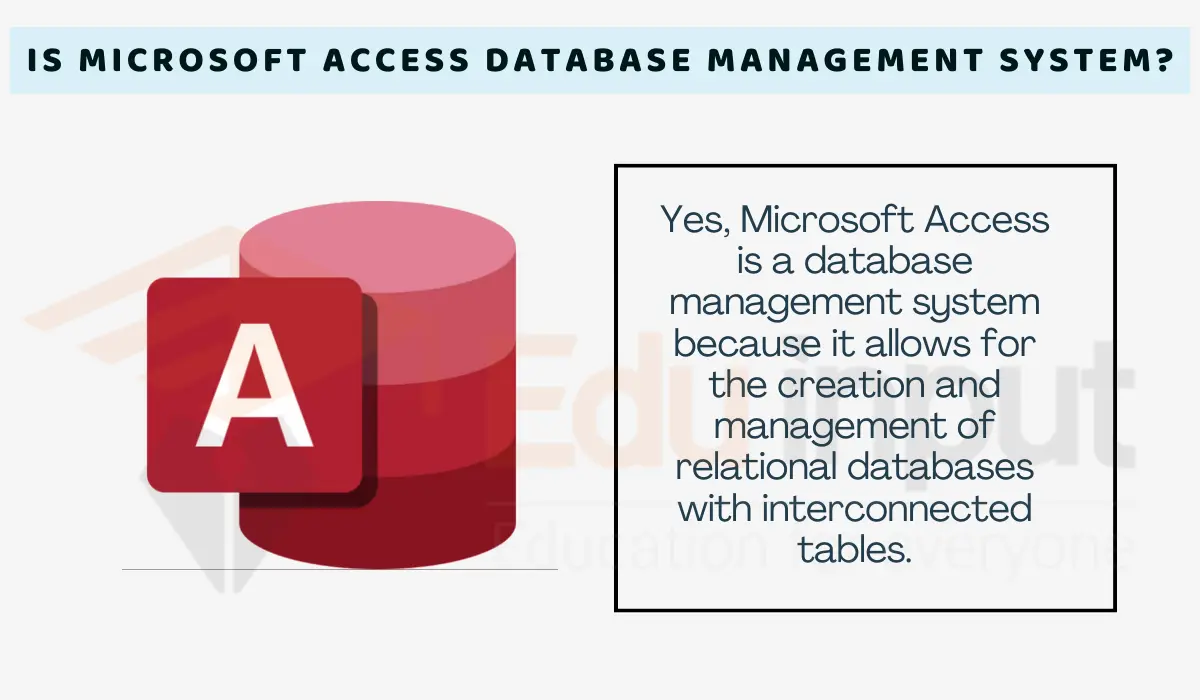

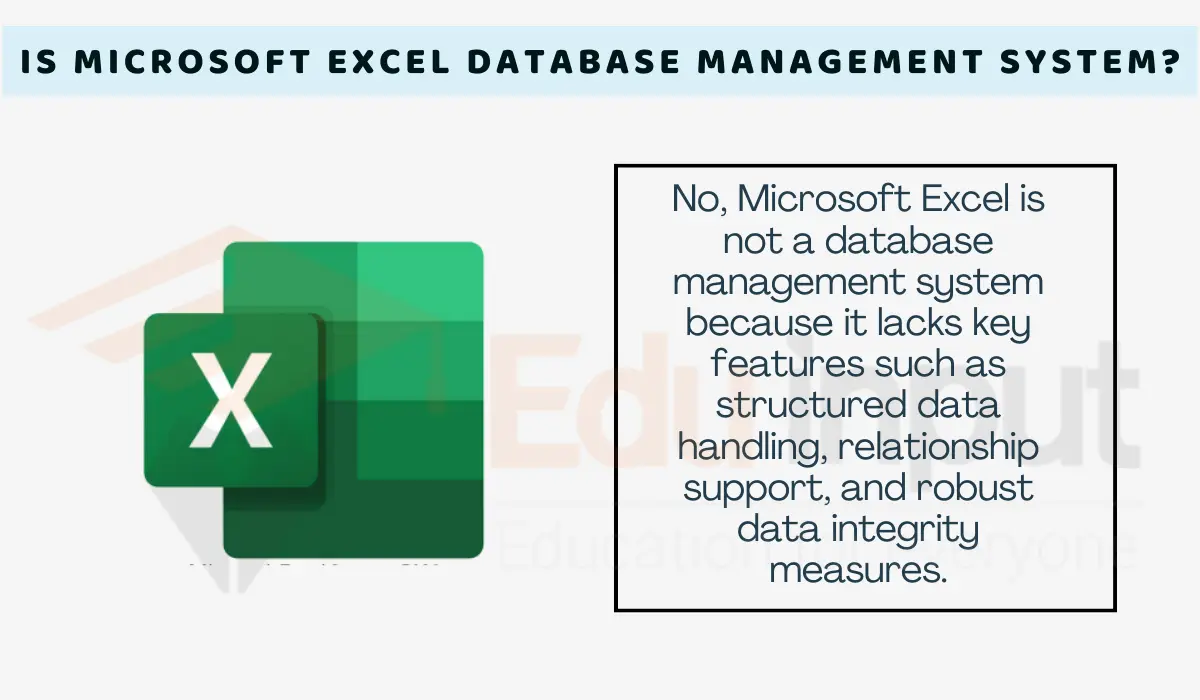



Leave a Reply